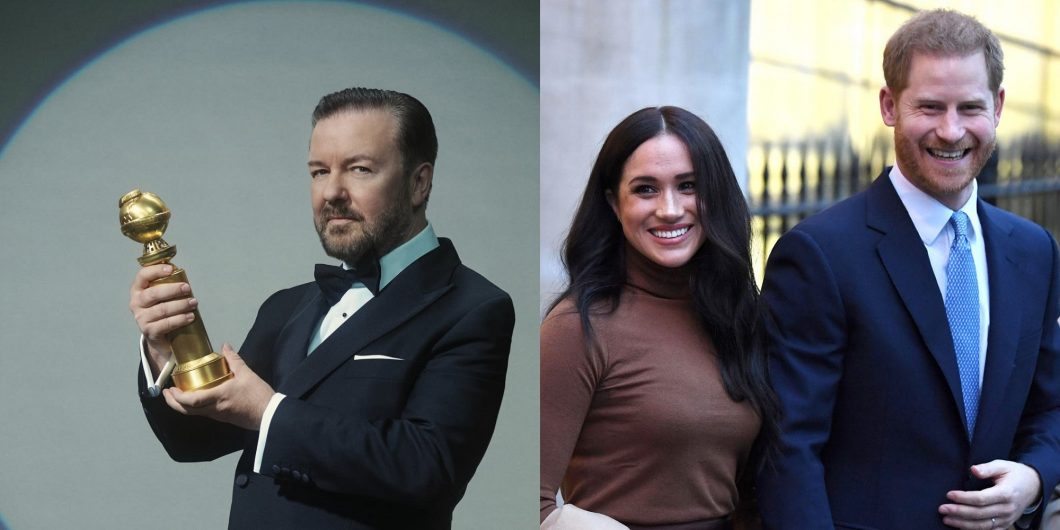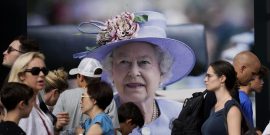It is for their own lost virtues, exemplified by the Queen, that the people mourn.
The Special Relationship Continues
This week has occasioned a remarkable example of the mutual influence of Britain and America, two countries bound by the special relationship, much more so now that Brexit is imminent. I speak of course of Englishman Ricky Gervais’s crashing the Golden Globes awards to humiliate Hollywood celebrities and American Meghan Markle crashing, well, the Royal Family, to humiliate Queen Elizabeth II in advance of her 94th birthday.
Both are examples of a great concern with class in our times, if at the expense of being classy. And both events are very rude gestures that shed light on our ongoing social transformations and how elites are dealing with them. In both cases, individuals who owe their fame and wealth to institutions of renown have humiliated them because these glamorous institutions commit the last unpardonable sin—hypocrisy.
Gervais is a self-made man who became famous in England for comedy, before moving to America, where the real celebrity and therefore the money is. He has survived every shift in the entertainment industry and developed as a dramatic storyteller, in parallel to his stand-up comedy, such that he is now a great success on Netflix. He is a Progressive liberal, too, but he hates the wokeness of our times.
At the Golden Globes, for the fifth time, he has brought to perfection the populist habit of insulting elites for their wickedness and corruption, in every matter ranging from Harvey Weinstein and Jeffrey Epstein to doing business with China. The beautiful people in entertainment, as well as the powerful, pretend to be morally superior to the rest of us, while exploiting human beings in ways that horrify us.
Gervais is all about egalitarianism in the service of justice. The job of the comic is to bring down the idols from their pedestals—to show people that the glamorous can be humiliated and that there is someone who dares tell them to their faces what we all think, without consideration for their power or privilege or political role in our troubled times.
In mounting a challenge like this, Gervais announces the death of celebrity itself. He does not propose to replace these hypocrites with others or with people who are not hypocritical, but to put an end to the crass showmanship and its exploitation of pretty young things. This is the reality TV version of his career, which has always been about focusing on ordinary people rather than exalted celebrities, trying to persuade people to face their ordinariness and deal with it with some humor and humanity.
His message has been remarkably successful in the digital environment, so he’s always invited back to host guests whom he continuously insults. After glamour must come scandal in the story of the demise of TV’s Fantasyland. As Twitter proves daily, scandal still gives corporations some profit out of celebrity. Since criticism is more democratic than worship, the entertainment industry is democratizing even as it destroys its most pious creations, the glamorous few.
Gervais directly told his real online audience to abandon these boring, obsolete award shows and stream his new Netflix show. His offline vulgarity is the negative preparation for his positive offering online, After Life, the story of a man learning to deal with his wife’s cancer death without committing suicide. Gervais suggests we should face the end of the world and live on—we don’t need elites and the glamorous promises they make. Meghan Markle offers a curious case here.
Markle is now the second American actress to ruin things for the British royal family, after Wallis Simpson. As Marx said, history repeats itself, as tragedy and then as farce. It’s no longer the low dishonest decade of the 30s, when Europe succumbed to a second bloodbath—nowadays, exposing the royal family to humiliation is mere tabloid stuff, Brexit notwithstanding. Nevertheless, it is a remarkable, if dishonorable achievement for an American adventuress.
Now, on the level of gossip, that is, private things, we would have to say that this adventuress figured out how weak and gullible the prince was and has not only persuaded him to marry her, but to make a scandal of his own family, which the press is only too glad to retail to the public, which cannot decide whether it admires the glamorous royal family or wishes to see them humiliated, or both.
This is not so rare as we might think, and it is important to learn from the vulgar wisdom of gossip—after all, our newfangled aristocrats are as vulnerable as the obsolete ones. In 2019, one of the richest most influential men on the planet, Jeff Bezos, was humiliated into a divorce by another adventuress, arguably a far more ridiculous show of the weaknesses of powerful men.
But in Bezos’ case, Amazon stock prices weren’t really affected and his position seems secure, whereas the royal family really is in bad shape. The only revered figure is the queen, who must soon shuffle off the mortal coil, leaving behind generations of mediocrities defined by scandals. These include her divorced son and heir apparent, Prince Charles, and her younger son, Prince Andrew, a close friend of the aforementioned Jeffrey Epstein, who was accused of raping girls and organizing a criminal sex ring to cater to his rich friends.
What shall come of the dignified part of the British constitution, as Walter Bagehot called the monarchy? It would seem a mere accident, just another piece of bad luck, that an adventuress should add to the troubles of a family tree already about to collapse because of rot. But this is more fate than luck—the newly created Duchess of Sussex, Meghan Markle, has a vision of royalty—woke Instagramming and selling branded merchandise.
Hence the announcement that these two pieces in the royalty chess set would like to give up some of their duties and the moralistic restraints imposed by the royal family in favor of a life of glamour and commerce. In a way, that’s the most American thing there is—exchanging the hallowed past for a profitable business in the present. Markle may be leading something of a hostile takeover, but it’s been done before.
This is of course the epitome of vulgarity, but it is not implausible. It’s hardly a surprise that the Duke of Sussex would marry a tabloid princess. But moving from psychology to sociology, we can see a bigger picture. Advertising woke moralism as a path to survival is how our elites have reacted to the collapse of their glamour and, with it, their credibility. Far from idiosyncrasy, it is typical of the global elite in entertainment, business, and politics.
What Gervais is trying to kill in Hollywood, Markle is trying to import to Buckingham. We are moving on from celebrity to something else. In truth, woke concerns itself with controlling corporate HR as much as we experience it through courts of law, public hysterias, and Twitter mobs. Woke enforces class separations by declaring most people too morally reprehensible to be woke. Surely it offers enough prestige to make woke royalty rich and influential in a way monarchy hasn’t been since WWII.
It is only natural for people to wish to be noble, for the few to want to distinguish themselves from the many by superior morality and greater splendor. But this can lead to madness—woke elites despising the rest of us as losers unfit to participate in the End of History. It’s unlikely that Instagram can power up a new version of monarchy, but it can surely humiliate and thus destroy what’s left of it.



